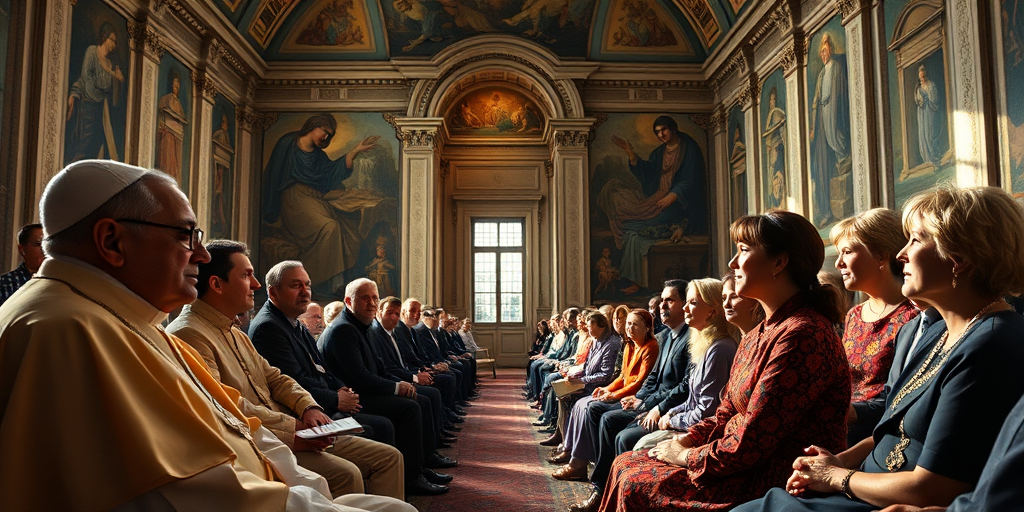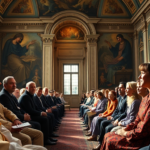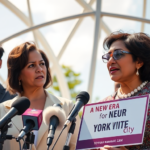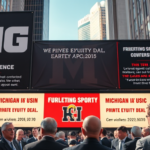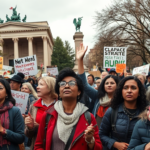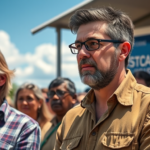Pope Leo XIV Celebrates Cinema with Hollywood Stars and Emphasizes Inclusion
The Vatican recently became the stage for a unique gathering as Pope Leo XIV welcomed a group of Hollywood’s most distinguished figures, including filmmakers Spike Lee, Cate Blanchett, and Greta Gerwig. This rare event was held in a frescoed audience hall, reflecting the Pope’s deep appreciation for cinema’s capacity to inspire and unite people worldwide.
A Call for Inclusion in Cinematic Storytelling
During the event, the American-born Pope Leo XIV, who grew up during the golden era of Hollywood, urged filmmakers to employ their art to amplify marginalized voices. “When cinema is authentic, it does not merely console but challenges,” he stated. “It articulates the questions that dwell within us, and sometimes it provokes tears that we didn’t know we needed to express.”
This call to action resonated deeply with attendees. Spike Lee, a director known for his socially conscious films, expressed his surprise and honor at being invited, presenting Pope Leo with a Knicks basketball jersey as a token of appreciation. Cate Blanchett highlighted the Pope’s profound understanding of cinema’s power to connect people by including diverse experiences and perspectives.
A Gathering of Diverse Talent
The audience was remarkable for its diversity, featuring prominent figures from the US and abroad, all connected through Martin Scorsese’s ties with the Vatican. Guests such as Monica Bellucci, Chris O’Donnell, Judd Apatow, and Leslie Mann mingled with Vatican officials, discussing the critical cultural role of cinema.
Archbishop Paul Tighe, representing the Vatican’s culture ministry, explained that while assembling the guest list was initially challenging, the strong turnout highlighted cinema’s universal relevance. “It’s a very democratic art form,” he emphasized. “This encounter celebrates an art form touching the lives of many people, recognizing its true importance.”
A Personal Connection to Film
Pope Leo XIV’s affection for cinema was a recurring theme throughout the event. He shared his favorite films, including classics like “It’s a Wonderful Life,” “The Sound of Music,” “Ordinary People,” and “Life Is Beautiful.” These selections reflect his belief in cinema’s power to evoke empathy and illustrate universal human experiences.
Moreover, the Pope addressed the precarious state of movie theaters, noting their decline and the subsequent loss of cultural meeting places. “I urge institutions not to give up but to cooperate in affirming the social and cultural value of movie theaters,” he remarked, drawing applause from the audience.
Engaging with the Secular World
The Vatican, under Pope Leo XIV’s leadership, continues efforts to engage with the secular world by hosting events that intersect with art and culture. This gathering aligns with past audiences arranged by Pope Francis, involving artists and comedians, to emphasize film as a fundamental and democratic art form.
As the Pope’s call for inclusion underscores cinema’s potential in bridging gaps, it is relevant to consider its implications locally. For communities, highlighting diverse voices in film can reduce stereotypes and foster understanding, enriching cultural narratives.
Local Impact and Future Implications
In the United States, film industry professionals are contemplating the Pope’s appeal to action with serious attention. Community leaders in cities known for rich cultural diversity, such as Los Angeles, see this initiative as parallel to ongoing efforts encouraging inclusiveness both onscreen and behind the camera.
Dr. Helen Rivera, a Los Angeles-based film historian, describes the Pope’s engagement as timely. “Cinema’s role in shaping public consciousness is undeniable. Embracing stories from marginalized groups not only diversifies filmmaking but also amplifies lesser-heard voices,” she commented.
Local initiatives promoting filmmakers from diverse backgrounds are likely to gain momentum from this event, encouraging wider representation in mainstream cinema. Furthermore, efforts to rejuvenate public interest in neighborhood cinemas, threatened by digital streaming platforms, could receive fresh advocacy and support from civic groups.
Fostering a Creative Renaissance
While the Pope Leo XIV’s gathering with Hollywood icons emphasizes the philosophical and communal benefits of inclusivity in cinema, tangible impacts at the community level are profound. This encouragement might inspire filmmakers and audiences alike to pursue a variety of narratives that reflect the complexity and beauty of diverse cultural experiences.
For residents keen on exploring ways to engage with inclusive storytelling, local film festivals and academies could serve as excellent platforms for learning and participation. By championing stories that transcend cultural and social boundaries, communities can cultivate a richer, more empathetic artistic landscape.
In conclusion, the Vatican event, highlighted by Pope Leo XIV’s visionary call for inclusion, resonates beyond the hallowed halls of the Vatican, potentially influencing film industry practices and reinvigorating community interest. It showcases how influential cultural dialogues can become powerful agents of change within local and global communities, reinforcing the collective yearning for stories that both unite and celebrate diversity.

